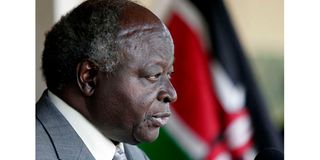Lessons for the youth from Kibaki’s political journey

The late President Mwai Kibaki.
President Mwai Kibaki entered Kenya’s politics while in his 30s. At a young age, he influenced local politics not only by drafting the Kanu constitution, but also as the chief executive officer of the party.
Kenya’s politics revolved around Kibaki’s intelligence at the party level.
As a young man, he saw it necessary not to sit back and watch the oldies take charge. With him was Tom Mboya, 30, and they were together also writing letters and organising scholarships for the next generation of scholars and leaders for a new Kenya. That airlift programme would take hundreds of Kenyans to the US for university studies, thus, preparing the youth for leadership in a new Kenya.
At 33, Kibaki was the MP for Donholm and was an assistant minister after that. Before he got into his 40s, he was already in the Jomo Kenyatta cabinet. He was there together with Mboya who, at 32, had been appointed the Minister for Justice and Constitutional Affairs – joining a cabinet that was, interestingly, very young.
Mboya was not alone. Other youths in the first Kenyatta Cabinet were Samuel Ayodo (33), Dr Julius Gikonyo Kiano (36), Charles Njonjo (42), Achieng Oneko (43), Dr Njoroge Mungai (37) and young permanent secretaries such as Kenneth Matiba (31), John Michuki (31) and many others who had taken top leadership positions.
So, what lessons do we learn from Kibaki? How the post-independent youth seized the opportunities, and, without any money, got into leadership is something that should encourage the youth of today to step forward and claim their position at the high table.
During those days, the first generation of educated youths dreamt of a better Kenya and how they would take over from the colonial government and guide the young country. It is thus clear that the youth have been tested before and the common saying that they are the leaders of tomorrow is hollow. The tomorrow for the youth is now.
What we know, at the basic level, is that they volunteered. They took positions and leadership roles in political parties. The likes of Mwai Kibaki had to leave the comfort of Makerere University, where he was an emerging scholar, to become the Kanu party executive officer, which was a junior position.
As Kenyans prepare for August 9 General Election, the youth should learn something from the founding fathers; that leadership is taken, not given.
We all recall that during the clamour for the second liberation, it was the Young Turks – the likes of Paul Muite, Gitobu Imanyara, James Orengo, Martha Karua, Raila Odinga, and Charity Ngilu – who galvanised the push and helped retrieve this country from dictatorship.
The youth have the energy and should rally together with passion and ape the likes of Kibaki and Mboya since they have shown that they can. The youth should take positions of power and should not be blinded by slogans and attempts to lock them out.
Thus, there is no harm for Kenya having a youthful president, governor, senator, woman representative or MCA, as long as they have the right vision for the people.
We know that during the nomination process, many youths lacked the financial muscle or were intimidated out of their quest for power in the perceived large parties. But that should not deter any of them.
The youth have the potential to elect leaders within their demography. In a country where 35.7 million of the country’s total population of 47.6 million are below 35 years old, and defined as youth, we cannot afford to leave 75 per cent of the leadership table and their numbers should be reflected in top positions.
Kibaki and Mboya refused to be part of the cheering squad – but were the leading team. That is how this country will secure its tomorrow. Kibaki is a good case study on how the youth can influence national politics from a very young age.
Irungu Nyakera is an aspirant for Murang’a governor position. Email: [email protected]




